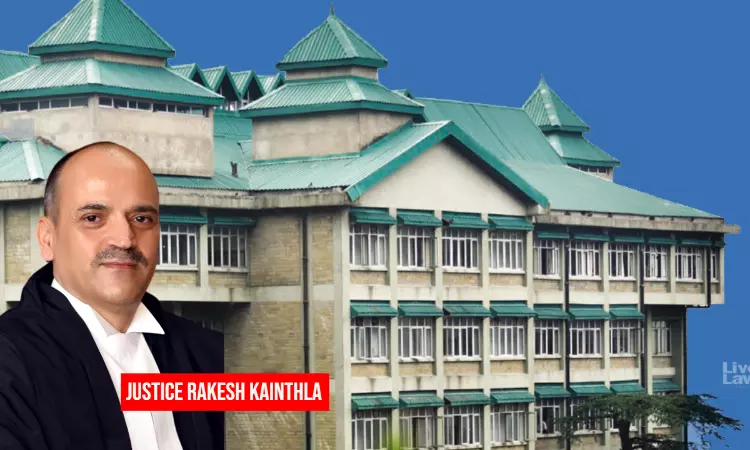- Home
- /
- High Courts
- /
- Himachal Pradesh High Court
- /
- Allegation Of Rape Based On False...
Allegation Of Rape Based On False Promise To Marry And Repeated Postponement Of Marriage - Can't Ground For Rape, Himachal Pradesh High Court
Mehak Aggarwal
21 May 2025 2:00 PM IST
Himachal Pradesh High Court held that in the absence of a clear allegation of refusal to marry, charges of rape under Section 376 of the Indian Penal Code can't be framed. The Court remarked that when parties are in a long-term relationship of five years, it becomes difficult to determine that their sexual relationship was based solely on a promise to marry.Justice Rakesh Kainthla: “There...
Himachal Pradesh High Court held that in the absence of a clear allegation of refusal to marry, charges of rape under Section 376 of the Indian Penal Code can't be framed. The Court remarked that when parties are in a long-term relationship of five years, it becomes difficult to determine that their sexual relationship was based solely on a promise to marry.
Justice Rakesh Kainthla: “There is not even a single averment made in the complaint that the accused had refused to marry the victim or that the marriage between them has become impossible. The fact that the parties maintained a relationship for five long years would make it difficult to hold that the sexual relationship was based upon a promise to marry.”
Background Facts:
The case originated from a complaint filed against the accused, Raj Kumar. The complainant and the accused used to study together and were in a relationship. In 2014, they decided to get married, mutually agreeing that the marriage would take place after 2-3 years, as the accused's family was constructing a house.
They got engaged in 2015, after which the complainant moved to Chandigarh to prepare for competitive examinations, where the accused frequently visited her, and they also had physical relations.
Although the marriage was initially planned for 2017, it was postponed due to a mishap in the accused's family. Subsequently, the accused shifted to Gwalior but did not inform the complainant. She then approached his family and disclosed their physical relationship, but was allegedly abused. However, the accused admitted the physical relationship and the marriage was decided to be held in 2019. However, it was later deferred again to 2021.
The complainant alleged that the accused's family demanded ₹5 lakhs and a vehicle as dowry. The entire incident was reported to the police, and an FIR was registered.
During the investigation, it was found that the accused had taken a loan of ₹27.9 lakhs for house construction. Although no blood or semen was found on most items collected during the investigation, human blood was found in the complainant's sample, and human semen was found on the accused's smegma slide.
The investigation concluded that the accused never intended to marry the complainant and used the promise of marriage to have sexual relations with her. It was also found that the accused's family had demanded dowry. Consequently, a charge sheet was filed in court.
Thereafter, the trial court framed charges against the accused for repeatedly engaging in sexual relations with the informant by falsely promising to marry her, along with cheating. Additionally, the court charged him and his family for demanding dowry as a condition for proceeding with the marriage.
Aggrieved by the Trial Court's decision, the accused filed a revision petition in the High Court, stating that there was no material in the charge sheet justifying the framing of charges.
Contentions of the Accused:
The accused stated that the complainant was 30 years old, educated, mature, and a rational person. She voluntarily indulged in the sexual act with the accused. The marriage was settled in 2014. They got engaged in 2015, and the marriage was to be performed in 2019. The relationship was consensual for more than 5 years.
He further claimed that there was no material to show that the complainant was misled. Also, when the demand of dowry was made the accused was not at home at that time. There
was no material that could be converted into legally admissible evidence.
Findings:
After going through the records of the case, the High Court observed that the complaint did not mention any specific refusal by the accused to marry the complainant or indicate that the marriage had become impossible. Instead, it was found that the parties had been in a relationship for five years and had postponed the marriage on multiple occasions with mutual agreement due to genuine circumstances like family issues.
The High Court remarked that the existence of a long-term, consensual relationship makes it difficult to determine that the sexual relationship was based solely upon a promise to marry.
In Mahesh Damu Khare Vs. State of Maharashtra 2024, the Supreme Court held that “when the promise to marry was made initially, but a person was not able to fulfil the promise, it would not fall within the definition of a false promise, attracting the penal provision of rape under Section 375 of the Indian Penal Code”
Therefore, the High Court set aside the Trial Court's order, stating that the accused can't be punished for the offence of rape as the promise of marriage made by him got delayed due to unforeseen circumstances and there was no clear allegation that he refused to marry.
Regarding the dowry allegations, the Court found no evidence that ₹5 lakhs was taken by the accused for house construction or marriage-related purposes. It was merely stated that a demand for ₹5 lakhs was made by the accused.
Thus, the High Court allowed the revision petition filed by the accused and the Trial Court's order was set aside.
Case Name: Raj Kumar Sharma v/s State of H.P.
Case No.: Cr. Revision No.524 of 2024
Date of Decision: 07.05.2025
For the appellant : Mr. B.L. Soni, Advocate.
For the respondent : Mr. Ajit Sharma, Additional Advocate General

